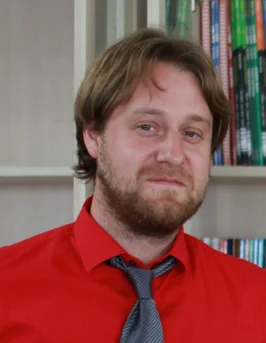
Carolin Heilig (ESR01)
Re-claiming ‘the people’: Young feminist activists in Poland
Relying on an ideational approach of populism, this paper explores how Polish feminists reclaim ‘the pure people’ and their relationship with left political forces.

Francesco Melito (ESR02)
This presentation analyzes the counter-hegemonic reaction against liberal values in the Polish neo-traditionalist discourse.

Michael Cole (ESR03)
Soft Power, Cats, Branding and the Ukrainian Far-Right
This presentation explores how far right populists use pets to soften their images on social media and appeal to wider audiences.

Sabine Volk (ESR04)
How do movements survive? Far-right PEGIDA as a protest ritual
Based on her original ethnographic data, Sabine Volk shows that far-right PEGIDA constitutes a standardized and repetitive protest ritual rather than strategic political action.

Andrzej Sadecki (ESR05)
Centenary of “Trianon” – Memory Politics in Orban’s Hungary
The presentation outlines the design and preliminary results of the research into the memory politics in Orbán’s Hungary, based on the case of the commemorations of the Treaty of Trianon.

Ionut Chiruta (ESR06)
Converging minority trans-border mobilization through nationalistic and populist frameworks
This presentation examines how Hungarian kin-state policy vis-à-vis Széklerland shifted towards building a ‘parallel world’ for the ethnic Hungarians in Romania through memory spaces.

Paulina Lenik (ESR07)
A pendulum swung back? Populist fever in the CEE
An overview of demand-side features of populism in the CEE and the West.

Elena Cossu (ESR08)
Political Economic Causes of Emerging Populism: Mapping and Conceptualizing Key Variables
This presentation explores the policy position of European populist parties and it tries to locate them across a classical and a redefined political spectrum.

Denis Ivanov (ESR09)
The Curious Case of Inequality and Political Party Competition in CEE: Lithuania, Hungary and Poland
The presentation retests the hypotheses posed by Tavits & Letki (2009; 2013) on how social cleavages and party strategies redefine party competition in CEE presenting the comparative case studies of Hungary and Poland.

Titil Ellingsen Thue (ESR10)
Competitive victimhood and memory re-elaboration: antisemitic narratives in Serbia and Croatia
The presentation analyses the impact of dominant discourses on historical memory and victimhood narratives on antisemitic prejudice in Serbia and Croatia.

Carlos Gómez del Tronco (ESR11)
This presentation sets in context how Islamophobic political discourse became mainstreamed in Czechia. It does so by looking at the evolution of measured attitudes, patterns of journalistic reporting, or recent historical themes in political discourse on Islam. At the same time, it defines the contours of ESR11’s project research design.

Olena Yermakova (ESR12)
The Mythology of Law and Justice’s (PiS) Migration Discourse
This paper identifies repetitive mythical structures and characteristics of political myth in the discourse of the Polish ruling Law and Justice party (PiS) on migration-related issues.

Slobodanka Dekic (ESR13)
Negotiating Family: Family Politics and LGBTIQ organizations in Serbia
The aim of this presentation is to analyse attempts by LGBT organizations to legalize same-sex partnerships as well as the politics behind this initiative and how their vision of same-sex partnerships (and families) correlates with the dominant, pro-natalist policies and ideal of traditional family model.

Mátyás Máté (ESR14)
Towards a Social Network Model of Political Success: The Case of Origo.hu and the Populist Take-Over in Hungary (2004-2019)
This presentation outlines the investigation of the case of Origo.hu’s — one of the most widely read Hungarian online news portal — ownership and editorial changes under the populist government of PM Orbán’s Fidesz party. It aims to point out specific theoretical and methodological features of populism, arguing that relational theories and social network methods are optimally positioned to explain this timely global phenomenon.

Mina Baginova (ESR15)
Activist Cultures of Contemporary Feminist Movements and Women’s Mobilizations in East Central Europe
The presentation briefly outlines the research design on the research in making about activist cultures of contemporary feminist movements and women’s mobilizations in East Central Europe.